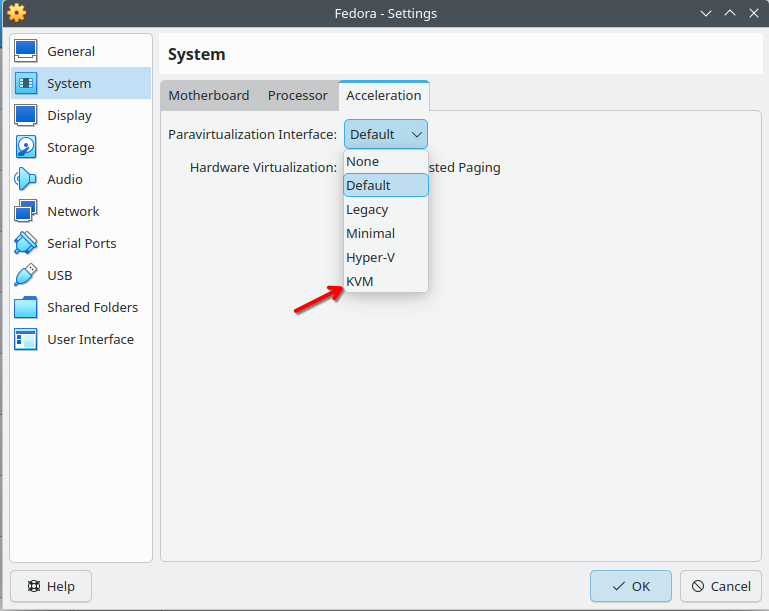Neat. As I am in the process of fully migrating to wayland, it is good. I only work as a teacher, so I don’t really concern about licensing, lol.
Maybe it can be installed in Debian 12 now without much trouble…
What ever you happens, do not use this for commercial purposes. Virtual box is free and libre but the guest addons are not. They will find and bill you for every single person in your company. Not per active user but per employee. This has cost companies millions
Under Linux you can just use KVM. Gnome boxes or virtual manager should work fine.
I use the version of VirtualBox that has been modified to use KVM as the back-end. Do you know if it has the same problems?
Hard to say. Just be mindful of blindly clicking “accept”
And they DO NOT CARE if you don’t actually use or install the extensions (unless something has changed, the guest add-ons are part of the free open source part, it’s the extensions for things like USB 2 support that aren’t free for commercial)
You can use it freely, by license, but they’ll come after you anyway
I’m still pissed that they bought Sun, so many great products now controlled by those assholes… Virtual box, MySQL, Solaris, Java…
The only license that VirtualBox and the Guest Additions are even released under is GPL3. I do not even see a dual license.
What remedy are they proposing when they come after you? I am not sure I would even take their call or respond to their letter. If I did, I would just send them the GPL text, announce that we are complying, and tell them to pound sand.
I suppose it might be fun to tell them that I got it via IBM or Red Hat or something and to take it up with them. But I probably would not actually be dishonest about. As above, if I got a letter asking me to pay for their GPL software, I would just mutter “idiots” and throw it away. If they want to persist, it would only cost them money and I would continue to respond the same way.
I’ve just seen quite a few posts about companies getting audited by Oracle over Virtual box and Java
Guest add-ons are free AFAIK. VirtualBox Extension Pack is not.
I just looked all this over and, just to clarify, both VirtualBox itself and the Guest Additions are free and released under GPL3.
https://www.virtualbox.org/wiki/Licensing_FAQ
What is not free is the separately downloadable “VirtualBox Extension Pack”.
As long as you stay away from the “Extension Pack”, you are ok.
Who cares. Why use sub par Type 2 virtualization with DKMS modules when you can use built+in world class, industry standard, Type 1 hypervisor with Qemu+KVM and Virt-Manager? Already has clipboard sharing with qemu-guest-agent.
Doesn’t VirtualBox use KVM if it’s available?
I like
VBoxManage. Any crazy thing I’ve ever imagined doing with a VM it’s already supported.So, to answer your question - I use VirtualBox because it does everything I want and I’ve never had a reason to look elsewhere.
No, VBox does not use KVM unless you use some off brand backend, which is an extra layer of complexity and software you must install and manage.
Absolutely everything you might want to do with VBoxManager is going to be available via virsh and the multiple libviet utilities.
I’ve never had a reason to look elsewhere.
Not using Type 2 hypervisor would be a good one. Not being beholden to Oracle’s shitry licensing schemes is certainly another.
Because for some reason, no matter what I try, Windows 10 desktop is laggy as hell on Qemu, and smooth out of the box on VirtualBox.
Are you using UEFI in Qemu?
Yeah, gotta have that and all that Secure Boot with TPM bullshit, because I’m visualizing a company workstation and nothing will work without those.
vbox is easy. qemu is kinda frustrating to use sometimes, although virt-manager makes it a little easier
vbox is easy until it starts saying vt-d isn’t enabled and refuses to start when it fact it is.
Virt-Manager provides a complete UI, with a four step wizard to creating a VM, how is vbox any easier?
Vbox will create a bridge with my wifi card (I’m a laptop user with no option for a wired nic in the host).
I’ve never been able to get kvm to do that and haven’t found any working instructions online that a simpleton like me can follow
Create the bridge with Network Manager advanced config, voilà!
Because at least for me getting a shared folder to work was a total pain in the ass. Virtualbox just worked in that regard.
I teach a class where I use VirtualBox. Students commonly use Windows or Mac. I use Linux.
It is very handily to use VirtualBox where, if I demo something, the same steps will work on the student machine. It is also nice for documentation if you want to show a screenshot.
I have never used the “extension pack” for this so it would be fine. Educational use seems to be permitted regardless.
Sir or Madame, this is a Wendy’s. You’re in the Linux com here.
Virtualizing Windows 10 for various binbows-only work stuff
Virtualizing Windows XP to run Office from before it started sucking
Are you paying for a Virtual box commercial license? They change for every employee in the company not just active users.
Just use KVM and be done with it. You can get the Windows guest drivers and addons from the Fedora project
Why would these not work in KVM exactly?
Ok so I guess I am the stupid because I always assumed kernel-level virtualization meant that you were limited to guest OS’s that used the Linux kernel. I was drawing incorrect connections to Docker
TIL
Yeah virtualization and containers are very different things. That said virt-manager can be used with LXC as well :)
For XP, the machine KVM presents as may be too new, but that isn’t an issue with non-virtualized QEMU.
I think it should work with some version of the Q35 chipset, if not
PCshould work. But Wine might be a better option if you just want to run some old version of office (or frankly just use LibreOffice)
I totally agree with you on the Linux side. However, I first got into Linux by using Virtualbox on Windows. In the Windows world, as far as I know, it’s the easiest-to-use free-as-in-beer1 hypervisor, so long as UEFI support has improved since I last used it.
1: I say this because of the non-libre extension pack.
I mean yeah, Qemu/KVM is Linux software. We’re talking about Linux here. Ain’t ever heard of that other thing you speak about. Think I I stalled it once in a VM to run some firmware update on some obscure device.
Hyper-v is bundled with windows now and is just as easy to use as virtualbox (slightly easier for windows guests since the drivers are bundled in the os)
Who would have thought? I’ve hardly touched Windows in over 2 years (mostly other people’s computers and the occasional app in my GPU-accelerated VM) so I haven’t kept up much.
Because they are for different use cases. I use QEMU+KVM on desktop for games and 3D CAD software, because of its undeniable performance advantage. But on work laptop, I use VirtualBox to test my software on different platforms. On VirtualBox it’s relatively easy to initialize a VM, configure network, file sharing and device passthrough, and its snapshot feature allows me recreate the same environment for troubleshooting
All this is true using Virt-Manager… Especially if you use the qemu-guest-agent.
I just looked them up and maybe you are right. But QEMU definitely lacks a GUI config tool that is both easy to use and allows for advanced features like snapshots. So far the only ones I know is GNOME Boxes and Virt Manager, and neither is as good as providing handy ways to configure as VirtualBox. I could probably just write the XML config or QEMU command by the documentation, but next time it could be a different scenario so I have to investigate the docs and maybe a few more forum posts. In VirtualBox, the buttons that do everything for me are always there
But QEMU definitely lacks a GUI config tool that is both easy to use and allows for advanced features like snapshots.
Let me say it louder for the people in the back: https://virt-manager.org/
It literally does everything you mentioned, including allowing you to edit the XML files manually to reach advanced or obscure features that are not exposed. And it can do it remotely via SSH, and it managed LXC and Xen too.
Last time I tried Virt manager, I couldn’t figure out bridge networks and ended up corrupted the XML config for the VM. Skill issue for me I guess
I think VBox is more user friendly? Virt-manager would need a GTK4 (?) update and a few UX improvements.
Certainly using a slightly dated Gtk is still more user friendly and better integrated than the god aweful stuff Oracle puts up. What UX improvements are you looking for?
I never got clipboard sharing working, on Fedora 40 KDE on Wayland. Probably a Wayland issue.
It should work out of the box but if not you can check to see if qemu-guest-agent is running
Virtual manager requires a lot less clicks. It also uses libvirt so you can run VMs in the background and on startup.
If you want a better UI look into other clients.
VBox could be nice, but Oracle is on a licensing hunt for people who install the extension pack on potentially work-related systems. Technically it is free for personal use, but is like explicitly inviting the vampire into your home - nothing might happen, but you wouldn’t know until the moment you have 2 tiny holes in your neck.
They don’t even care if you don’t get the extension pack, we’ve been pestered by those leeches even for the open source licensed for all use main package only
Use software owned by Oracle? Fuck that, I would rather get mauled by a bear.









